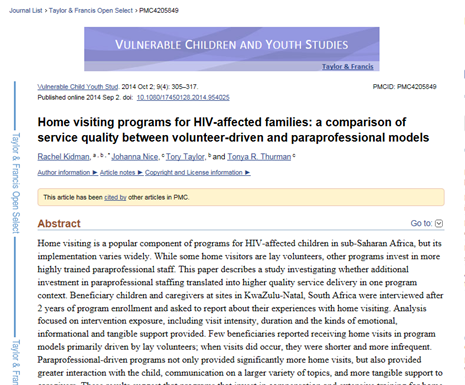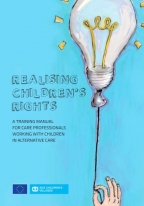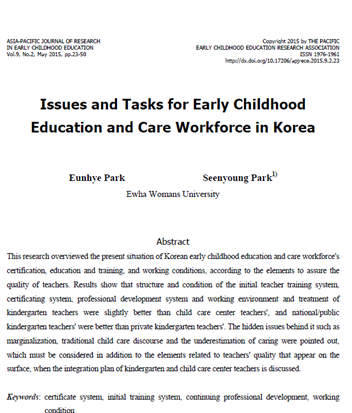Training & professional development
Summary:
Home visiting programs for HIV-affected families: a comparison of service quality between volunteer-driven and paraprofessional models investigated whether or not additional investment in paraprofessional staff translated into higher quality service delivery. The study, conducted in KwaZulu-Natal, South Africa was conducted over a two-year span. The results suggested that compensation and extensive training programs for home visitors are better able to serve and retain beneficiaries than volunteer home visiting programs.
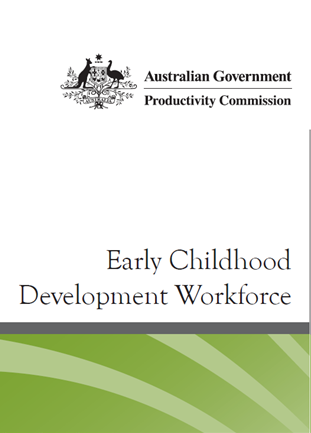
Summary:
The early childhood development sector plays an important role in fostering the education, health and care of young children. Early childhood education and care services are currently the subject of significant reforms nationally. These reforms have substantial implications for the associated workforce. This report, the second of three on education and training workforces, focuses on the early childhood development workforce. It follows the Vocational Education and Training workforce report released in May 2011. The third report, on the Schools workforce, is underway and will be completed in April next year.
The Commission’s recommendations and findings seek to support the future development of the early childhood workforce required to underpin the nationally agreed reforms. In particular, guidance is provided on the provision of quality early childhood education and care services to children with additional needs, Aboriginal and Torres Strait Islander children and children in rural and remote locations.
Summary:
SOS Children’s Villages has been working to embed children’s rights within care settings for many years. Our approach has been multifaceted, embracing structures and institutions, care professionals and young people themselves. One gap identified in the course of this work has been the absence of effective training programmes for care professionals which have children’s rights at the core. This manual has been produced to fill that gap. The two-day course outlined in these pages is designed to familiarise groups of care professionals with the international standards and principles surrounding children’s rights – and above all, to relate this to the daily experience and challenges arising in the field of alternative care. The course is intended to provide participants with the information, motivation and strategies that they can use to carry children’s rights into their daily work. The aim is to contribute to higher quality care and a culture of respect for children’s rights.
Summary:
This bulletin for professionals presents an overview of child welfare supervision and explores the dimensions of supervision that agencies may want to consider as they seek to strengthen the effectiveness of their services to children and families. This bulletin is designed to provide child welfare supervisors, managers, and related professionals with examples of States’ efforts to strengthen supervisory capacity and with tools and resources to enhance supervisory skills.
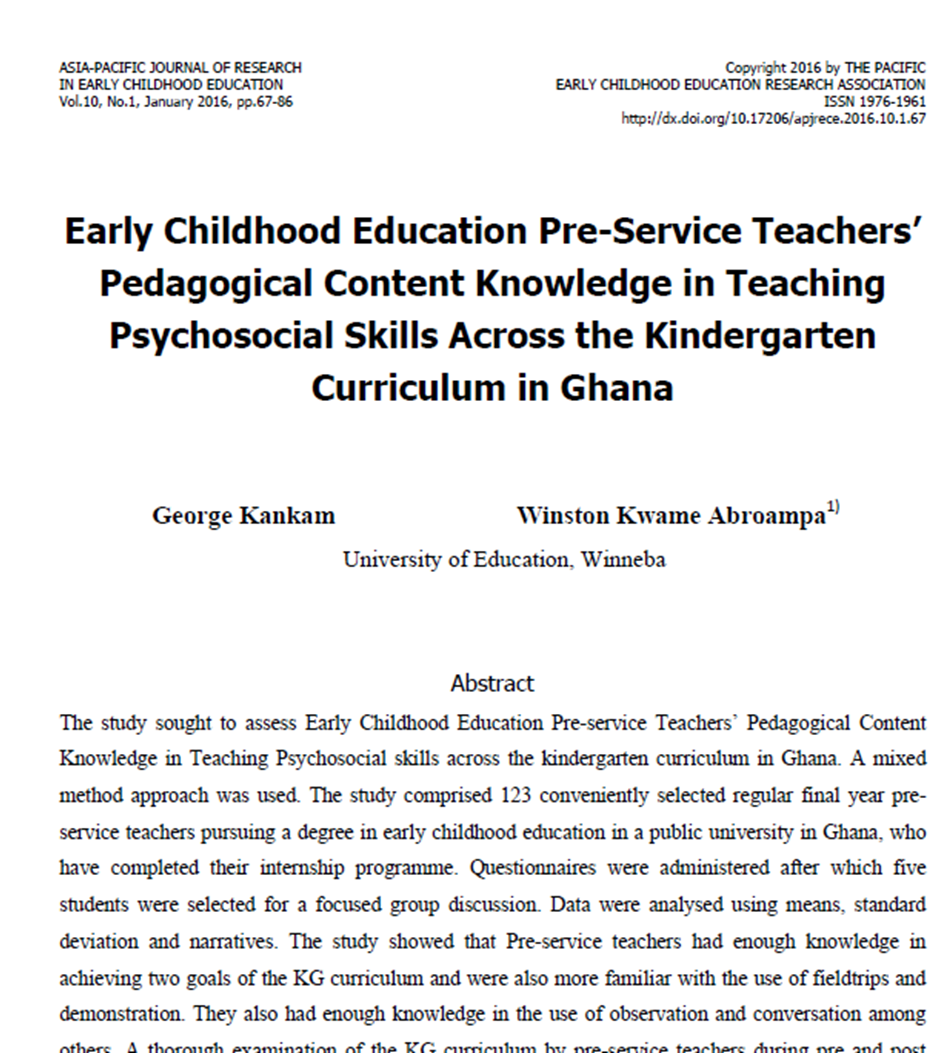
Summary:
Early Childhood Education Pre-Service Teachers’ Pedagogical Content Knowledge in Teaching Psychosocial Skills Across the Kindergarten Curriculum in Ghana assesses early childhood education pre-service teachers’ knowledge in teaching psychosocial skills across the kindergarten curriculum in Ghana. The research, published in the Asia-Pacific Journal of Research in Early Childhood Education, questioned 123 pre-service teachers pursuing a degree in early childhood education. The following research questions were the driving force behind this study:
- How adequate is pre-service teachers’ knowledge in the constituents of psychosocial skills in the curriculum?
- How adequate is pre-service teachers’ knowledge in the use of interactive techniques in inculcating psychosocial skills across the curriculum?
- How adequate is pre-service teachers’ knowledge in the use of assessment procedures in inculcating psychosocial skills across the curriculum?
The study concludes with implications for the early childhood curriculum in Ghana and recommendations for improvement.
Summary:
The Innovative Pedagogical Approaches in Early Childhood Care and Education (ECCE): A Resource Pack includes case studies from nine countries. Each is an example of an innovative pedagogy developed according to a specific context and with concern for sustainable learning.This resource pack discounts the idea that ECCE should solely rely on a “universalized ‘one size fits all’ model" and emphasizes the need for ‘real-life’ approaches that connect children with their communities. Innovations in ECCE in the Asia-Pacific region are often intended to improve not only the lives of children but also those of the entire community. These examples of transformational pedagogy are inspirational reads for practitioners, researchers, and policymakers.
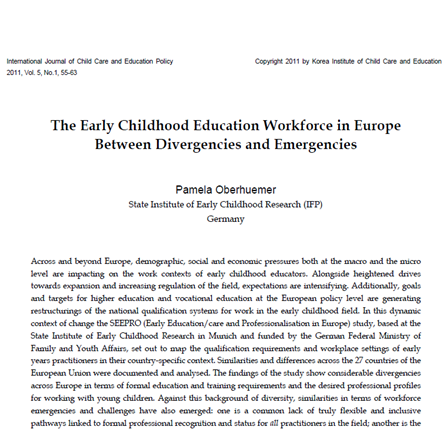
Summary:
Across and beyond Europe, demographic, social and economic pressures both at the macro and the micro level are impacting on the work contexts of early childhood educators. Alongside heightened drives towards expansion and increasing regulation of the field, expectations are intensifying. Additionally, goals and targets for higher education and vocational education at the European policy level are generating restructurings of the national qualification systems for work in the early childhood field. In this dynamic context of change the SEEPRO (Early Education/care and Professionalisation in Europe) study, based at the State Institute of Early Childhood Research in Munich and funded by the German Federal Ministry of Family and Youth Affairs, set out to map the qualification requirements and workplace settings of early years practitioners in their country-specific context. Similarities and differences across the 27 countries of the European Union were documented and analysed. The findings of the study show considerable divergencies across Europe in terms of formal education and training requirements and the desired professional profiles for working with young children. Against this background of diversity, similarities in terms of workforce emergencies and challenges have also emerged: one is a common lack of truly flexible and inclusive pathways linked to formal professional recognition and status for all practitioners in the field; another is the continuing need to seek more effective ways of including men in the early childhood workforce.
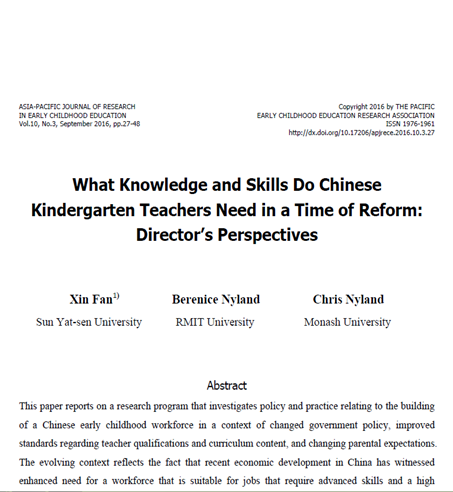
Summary:
This paper reports on a research program that investigates policy and practice relating to the building of a Chinese early childhood workforce in a context of changed government policy, improved standards regarding teacher qualifications and curriculum content, and changing parental expectations. The evolving context reflects the fact that recent economic development in China has witnessed enhanced need for a workforce that is suitable for jobs that require advanced skills and a high capacity to learn. This identified need has brought a renewed interest in early childhood education. Subsequently, policy makers have raised questions regarding what early childhood teachers should know and the skills they need to acquire to be competent practitioners.
The research findings draw on interviews conducted with 24 kindergarten directors from provinces across China. The interview explored opinions about skills and attributes teachers require, level and form of knowledge they need, and how teachers’ capacities might be enhanced.
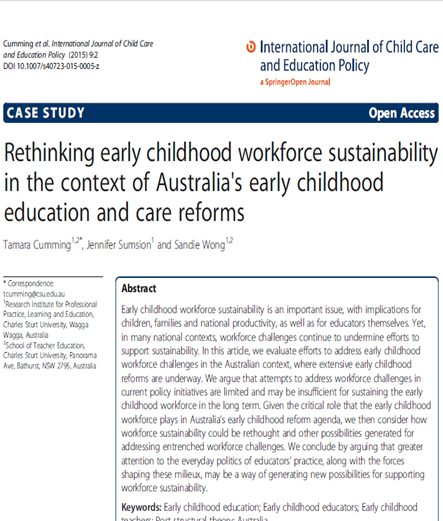
Summary:
Early childhood workforce sustainability is an important issue, with implications for children, families and national productivity, as well as for educators themselves. Yet, in many national contexts, workforce challenges continue to undermine efforts to support sustainability.
In this article, we evaluate efforts to address early childhood workforce challenges in the Australian context, where extensive early childhood reforms are underway. We argue that attempts to address workforce challenges in current policy initiatives are limited and may be insufficient for sustaining the early childhood workforce in the long term. Given the critical role that the early childhood workforce plays in Australia’s early childhood reform agenda, we then consider how workforce sustainability could be rethought and other possibilities generated for addressing entrenched workforce challenges. We conclude by arguing that greater attention to the everyday politics of educators’ practice, along with the forces shaping these milieux, may be a way of generating new possibilities for supporting workforce sustainability.
Summary:
This research overviewed the present situation of Korean early childhood education and care workforce's certification, education and training, and working conditions, according to the elements to assure the quality of teachers. Results show that structure and condition of the initial teacher training system, certificating system, professional development system and working environment and treatment of kindergarten teachers were slightly better than child care center teachers', and national/public kindergarten teachers' were better than private kindergarten teachers'. The hidden issues behind it such as marginalization, traditional child care discourse and the underestimation of caring were pointed out, which must be considered in addition to the elements related to teachers' quality that appear on the surface, when the integration plan of kindergarten and child care center teachers is discussed.
